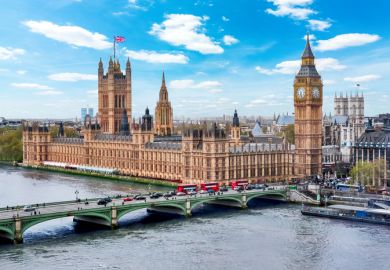The UK higher education sector will suffer if the National Union of Students cannot act as a strong voice for learners, it has been warned.
NUS representatives are being removed from all Department for Education groups, as well as arms-length bodies such as the Office for Students, the English regulator, amid concerns about alleged antisemitism within the organisation.
The department also promised not to provide funding to the NUS – although it is understood no funding is currently being provided – and higher education minister Michelle Donelan has written to the body that oversees the election for NUS president, asking for more information on how the electoral process was carried out.
The union now faces trying to retain its relevance from the outside during a crucial period for UK higher education, as sector funding arrangements are redrawn and debates over campus free speech continue.
Nick Hillman, director of the Higher Education Policy Institute, said there was a “sad air of inevitability” about the latest breakdown in relations as the NUS has been in the “last-chance saloon” with the government for a while.
“The NUS could have chosen to be a really effective voice for students on issues like maintenance support but it’s chosen to go down another route. I hope it can recover over time because we all benefit when the NUS is focused, democratic and moderate,” he said.
Relations between the NUS – which is celebrating its 100th anniversary – and the Union for Jewish Students hit a new low earlier this year after the NUS invited rapper Lowkey to perform at its annual conference, days after he claimed that media organisations had “weaponised the Jewish heritage” of Ukrainian president Volodymyr Zelensky. NUS president Larissa Kennedy allegedly said students concerned about the performance could wait in a safe room until it was over.
The new NUS president, Shaima Dallali, then apologised after a tweet she sent in 2012 emerged that referenced a massacre of Jewish people in the year 628.
The DfE measures were being kept under review and ministers said that although NUS had “shown willingness” to respond to concerns of late, substantive action will be needed before they are willing to re-engage with the body, the only independent national organisation that represents the country’s 7 million students. In the meantime, students from the Office for Students’ panel or individual students’ unions will be drafted in to fill the seats vacated by the NUS.
“Jewish students need to have confidence that this is a body that represents them, and we need to be sure that the student bodies that we engage with are speaking fairly for all students, which is why we are disengaging with the NUS until the issues have been addressed,” said education secretary Nadhim Zahawi, who has previously accused the NUS of “systemic antisemitism”.
An NUS spokesman said it was disappointed the government had chosen to announce the news via a press release “rather than seeking to engage with us directly”.
He stressed that an independent investigation has been launched following a complaint about antisemitism and the organisation will soon be appointing a QC, in consultation with the UJS.
“We have sought to undertake the investigation in a serious and proper way, and are working in collaboration with UJS at every step of the way. Once the QC has been appointed we will be able to update on the process and timeline. We look forward to working with the government constructively on this matter.”
Register to continue
Why register?
- Registration is free and only takes a moment
- Once registered, you can read 3 articles a month
- Sign up for our newsletter
Subscribe
Or subscribe for unlimited access to:
- Unlimited access to news, views, insights & reviews
- Digital editions
- Digital access to THE’s university and college rankings analysis
Already registered or a current subscriber?








